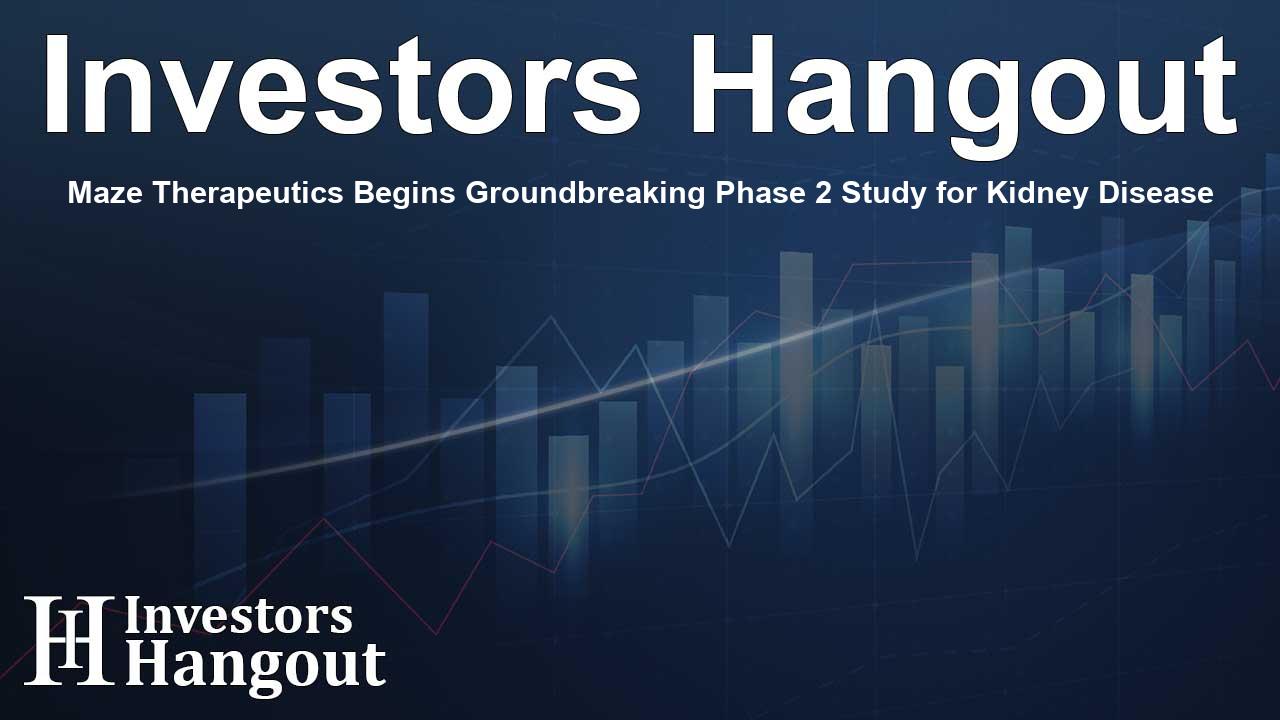Maze Therapeutics Begins Groundbreaking Phase 2 Study for Kidney Disease

Maze Therapeutics Doses First Patient in Phase 2 HORIZON Trial
Maze Therapeutics, Inc. (Nasdaq: MAZE) has announced an important milestone in its clinical research efforts. The company has dosed the first patient in the Phase 2 clinical trial known as the HORIZON Study, which evaluates MZE829 as a potential treatment for patients suffering from APOL1 kidney disease (AKD). This innovative oral small molecule inhibitor is designed specifically to target the genetic underpinnings associated with AKD, a serious condition estimated to afflict over one million individuals in the United States.
What Is the HORIZON Study?
The HORIZON Study is a Phase 2, open-label trial featuring a basket design aimed at assessing the effectiveness of MZE829. In this study, participants with AKD who carry the high-risk APOL1 alleles (G1, G2) will be stratified based on their clinical characteristics and level of proteinuria. This differentiation allows for a nuanced understanding of MZE829’s therapeutic impact across various patient profiles, including those with related conditions such as type 2 diabetes.
The Importance of Patient Diversity
One of the distinguishing features of the HORIZON Study is its inclusive enrollment criteria, which seek to capture a wide diversity of patients. From those experiencing severe symptoms like nephrotic range proteinuria to individuals with milder manifestations, the trial represents a comprehensive approach to tackling AKD. Furthermore, it is the first of its kind to investigate the impact of a small molecule APOL1 inhibitor on diabetic patients suffering from AKD, highlighting Maze’s commitment to innovative research.
Endpoints and Evaluation Metrics
The primary goal of the HORIZON Study is to measure the reduction of proteinuria, a marker of kidney function. Specifically, researchers aim to identify the percentage of trial participants who experience a 30% or greater decrease in their urinary albumin-to-creatinine ratio (uACR) by week 12. Existing literature supports the use of uACR as a significant indicator of clinical benefit, especially in the context of hypertension and diabetes.
Looking Forward
The excitement surrounding the HORIZON Study is palpable, with Maze expecting to present proof of concept interim data as early as the first quarter of 2026. The potential implications for patients suffering from AKD are monumental, as MZE829 may usher in a new era of treatment aimed at fundamentally altering the course of this disease.
About Maze Therapeutics
Maze Therapeutics stands out in the biopharmaceutical landscape as a clinical-stage company dedicated to leveraging human genetics in the development of small molecule precision medicines. The company’s focus prioritizes renal, cardiovascular, and metabolic diseases, addressing critical health challenges that face many individuals today. The innovative Compass platform utilized by Maze provides valuable insights into the genetic factors that drive disease progression, guiding the development of personalized treatment options.
Pipeline and Future Developments
The company's pipeline features two key programs, MZE829 and MZE782, both representing groundbreaking approaches tailored to the unique needs of patients. As Maze Therapeutics continues to advance its research agenda, the potential for impactful treatments expands. MZE829's unique properties position it as a promising agent in the fight against kidney disease, packed with the potential to improve patient outcomes.
Frequently Asked Questions
What is MZE829?
MZE829 is an oral small molecule APOL1 inhibitor being evaluated by Maze Therapeutics for its efficacy in treating APOL1 kidney disease.
What are the key goals of the HORIZON Study?
The primary objective is to reduce proteinuria significantly, aiming for a 30% or greater drop in urinary albumin-to-creatinine ratio in participants over 12 weeks.
Who is eligible for the HORIZON Study?
Patients with APOL1 kidney disease carrying the high-risk G1 and G2 alleles, as well as those with type 2 diabetes, may participate in the study.
When is the expected data readout for the trial?
Maze Therapeutics anticipates releasing proof of concept interim data in the first quarter of 2026.
What other conditions is Maze Therapeutics focusing on?
In addition to AKD, Maze Therapeutics is developing treatments aimed at cardiovascular and related metabolic diseases, using insights from genetics.
About The Author
Contact Hannah Lewis privately here. Or send an email with ATTN: Hannah Lewis as the subject to contact@investorshangout.com.
About Investors Hangout
Investors Hangout is a leading online stock forum for financial discussion and learning, offering a wide range of free tools and resources. It draws in traders of all levels, who exchange market knowledge, investigate trading tactics, and keep an eye on industry developments in real time. Featuring financial articles, stock message boards, quotes, charts, company profiles, and live news updates. Through cooperative learning and a wealth of informational resources, it helps users from novices creating their first portfolios to experts honing their techniques. Join Investors Hangout today: https://investorshangout.com/
The content of this article is based on factual, publicly available information and does not represent legal, financial, or investment advice. Investors Hangout does not offer financial advice, and the author is not a licensed financial advisor. Consult a qualified advisor before making any financial or investment decisions based on this article. This article should not be considered advice to purchase, sell, or hold any securities or other investments. If any of the material provided here is inaccurate, please contact us for corrections.
